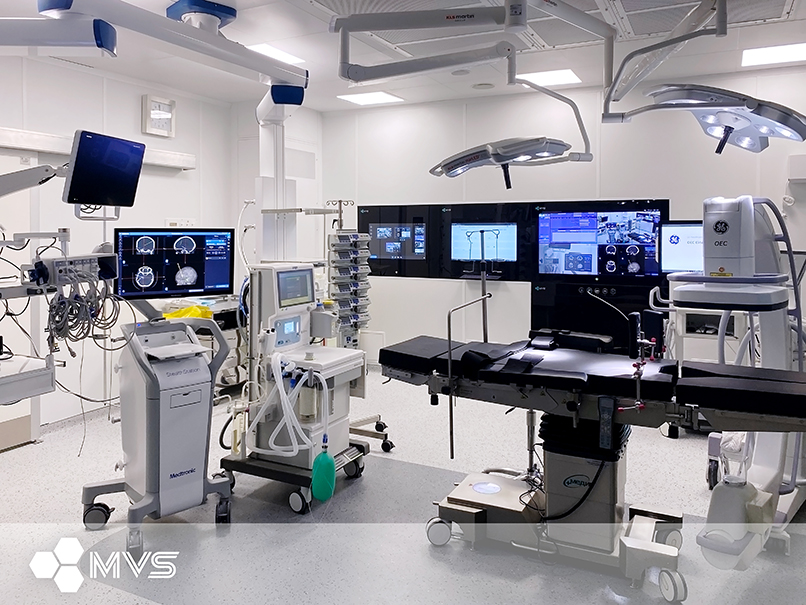On December 28, 2022, the official opening of the new building of the V. V. Veresaev Clinical Hospital took place. The state–of-the-art rapid-response stationary complex includes a high-tech operating unit with MVS Smart operating rooms. The opening ceremony was personally attended by Moscow Mayor Sergei Semenovich Sobyanin and Deputy Mayor of Moscow for Social Development Anastasia Vladimirovna Rakova.
The V. V. Veresaev City Hospital is one of the largest multidisciplinary hospitals in Moscow. Provides planned and emergency specialized medical care in therapeutic and surgical profiles.
The history of this Moscow hospital began in the 30s of the XX century with an outpatient clinic for workers of the Lianozovsky Electromechanical Plant. Today, the hospital is among the leaders of the capital’s healthcare and is the clinical base of many scientific and educational medical institutions.

In 2019, the V. V. Veresaev State Clinical Hospital was included in the city program for the modernization of medical infrastructure projects – the construction of emergency care inpatient complexes (ECIC) at leading medical institutions in Moscow. It is symbolic that it is in 2022 that the hospital celebrates the 85th anniversary of its foundation, and puts into operation an ultra-modern inpatient complex.
The operating unit of the new rapid-care stationary complex of the V. V. Veresaev State Clinical Hospital includes MVS Smart operating rooms from a Russian manufacturer (Medical Visual Systems Ltd). What does this mean and how will the work of doctors change?
A smart home for the surgeon and the patient
Engineering systems and medical equipment in the operating rooms are integrated and controlled from a single control panel according to the “Smart Home” principle.
Before surgery, doctors will be able to quickly set up the workspace in the operating room using a centralized control panel. With one touch of the screen, doctors can control temperature, humidity, lighting (ceiling and surgical lights), while setting templates can be saved.
Without leaving the operating room and without wasting valuable time, doctors can access the patient’s medical record, laboratory and diagnostic tests.
During the operation, visualization is configured using the video management function – any necessary images are distributed across monitors inside the operating room.
The following video sources can be used: an endoscopic camera, a surgical microscope, an anesthesiological monitor, CT and MRI images, images from X-ray diagnostic and ultrasound devices used for intraoperative diagnosis.
For example, at the V. V. Veresaev Hospital, the neurosurgical navigation station Medtronic Stealth Station is integrated into the MVS complex as one of the video sources.
The image is transmitted to 4K viewing monitors, making it easier for doctors to work, and residents can monitor the operation on other monitors without taking up space around the operating table.
It will be possible to monitor the operation without entering the operating room: using the MVS Platform software, the video streams of the operation is available to authorized users from any hospital room, for example, from the resident’s room, the chief physician’s office, while all connected video sources are available for viewing.
According to doctors, one of the key features of Smart Operating Rooms is a video recording of the operation synchronized across all sources. The videos will be stored in a single video archive of hospital operations and will become a unique training base for the training and advanced training of a wide range of medical specialists.
The MVS team thanks the management of the V. V. Veresaev State Clinical Hospital for their trust and wishes the hospital further sustainable development for the benefit of patients and the country’s healthcare system.
Emergency inpatient complexes (EIC) are a unique project in Moscow, a new standard for providing hospital emergency care.
They are created on the basis of six multidisciplinary hospitals: the N.V. Sklifosovsky Research Institute of Emergency Medicine, the V.V. Veresaev City Clinical Hospital, the S.P. Botkin City Clinical Hospital, the O.M. Filatov City Clinical Hospital No. 15, the V.M. Buyanov City Clinical Hospital and the city Clinical Hospital No. 1 named after N.I. Pirogov.
Emergency inpatient complexes are modern medical facilities for emergency care and imply a new approach when working with a patient using the doctor-to-patient system, which will allow Muscovites to be accompanied at all stages of treatment. The capacity of the EIC will allow to receive up to one and a half thousand patients per day. In emergency cases, it will be possible to deliver the patient to the emergency complex by air ambulance. Thanks to a single digital system, patient data from emergency medical services will be available to the doctor online even before the ambulance arrives. At this time, the patient’s relatives will be able to wait for him in the recreation areas or use the services of a psychological support room.
